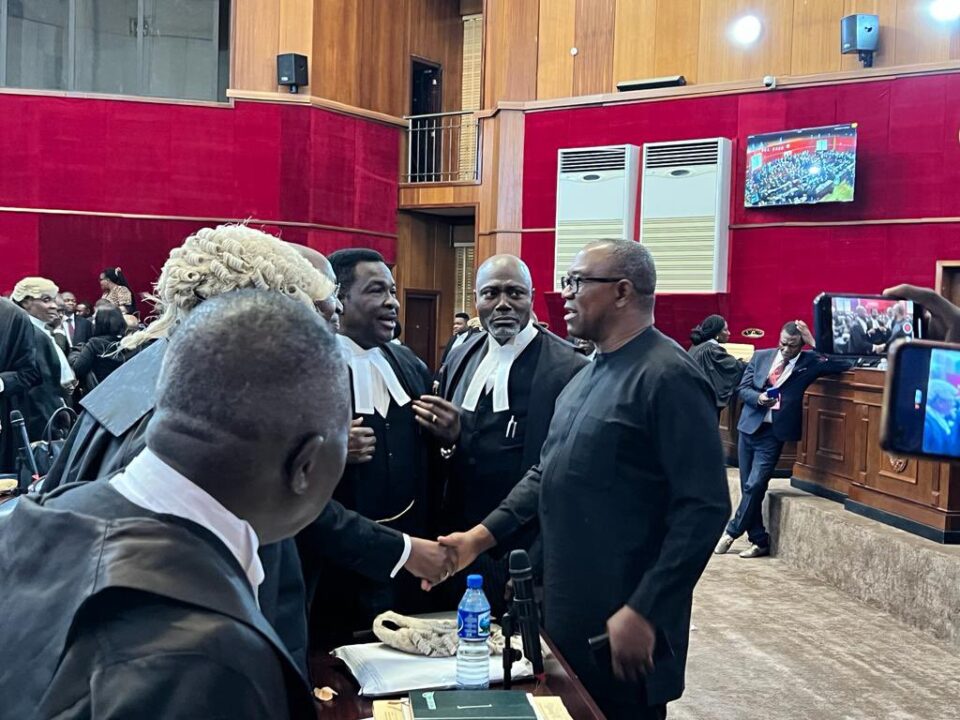Two video clips submitted by the Labour Party and its presidential candidate, Peter Obi, in support of his petition challenging the conduct and outcome of the February 25 presidential election were admitted into evidence by the Presidential Election Petition Court.
At the resumption of the hearing on Friday evening, the petitioners informed the court, through their counsel, Jubril Okutekpa, SAN, that they had subpoenaed Channels Television to produce the recordings contained on two flash drives.
Okutekpa stated that the TV station received two separate subpoenas, dated May 30 and June 6, and that one of its employees was sent to provide the requested evidence.
The five-member panel led by Justice Haruna Tsammani admitted the subpoenas as evidence and labelled them as Exhibits PBH-1 and PBH-2.
One of the flash drives is said to contain video clips of an interview given by the chairman of the Independent National Electoral Commission, Mahmoud Yakubu, prior to the general elections, in which he assured that the election results would be electronically transmitted in real-time.
The other includes a press conference by Festus Okoye, a national commissioner of the commission, who reiterated the body’s commitment to electronically transmit the results.
Lucky Obese-Alawode, a senior reporter and editor at Channels TV, was called to the witness stand in order to present the content of the video clips in open court. The petitioners’ move, however, was strongly opposed by the petitioners’ respondents.
Akin Olujinmi, SAN, counsel to President Bola Tinubu, questioned the witness’s competence on the grounds that his statement was not filed alongside the petition.
Tinubu’s lawyer argued that the law requires a petition to be filed within 21 days of the declaration of the result of an election, citing paragraphs 4 (5) and (6) of the First Schedule to the Electoral Act 2022.
READ ALSO:
- Election Petition Court Admits Two Video Clips Evidence Supporting Obi’s Petition
- What The Electricity Act Which Tinubu Signed Into Law Today Means To Nigerians
- Jimoh Ibrahim’s Financial Status Threatened as He Loses Appeal To Recover N69.4 Billion Assets Debt From AMCON
He claimed that when the petition was filed, the petitioners should have attached all necessary documents as well as a list of witnesses they planned to call in support of their case.
“A petition that fails to comply shall not be accepted,” the law states. The statement of this witness was served on us after the proceeding began today, my lords.
“This is more than three months after the election results were declared.”
“The petitioners did not name this witness, and his statement was not attached to the petition.” Tinubu’s lawyer insisted, “To that extent, he is not a competent witness who can testify before this court.”
He claimed that the petitioners were aware that they would rely on the video recordings when they filed the petition, but did not include it in their list of documents.
In line with Olujimi, SAN’s disapproval, the INEC, through its lawyer, Kemi Pinhero, SAN, argued that Obi and LP should have included the proposed evidence in their petition.
However, counsel for the petitioners, Okutekpa, SAN, contended that the witness was competent to testify because the subpoena was a court order over which he had no control.
Despite the objections, the panel admitted the two flash drives into evidence as Exhibits PBH-3 and PBH-4.
When the petitioners’ counsel requested that the contents of the flash drives be played in open court, the respondents disagreed, with the exception of the electoral commission, which was unconcerned.
Olujimi insisted that his client was not given a copy of the flash drive.
He went on to say that playing the video clips without his clients’ knowledge of their content could deprive them of their right to a fair hearing.
“This is not a game of hide and seek,” he explained. We have the right to be served with a copy so that we can learn about the content and prepare. We will not allow it to be played until we are served.
Solomon Umoh, SAN, counsel for the All Progressives Congress, said it would be an ambush for the petitioners to play the content of the flash drives without first serving it on the respondents.
In his decision, the chairman of the five-member panel, Justice Tsammani, stated that the respondents’ position is not prejudiced against playing the video clips, but rather on their failure to serve beforehand.
Tsammani, however, postponed the matter until Saturday afternoon, June 10, to allow the video clips to be played in open court.


